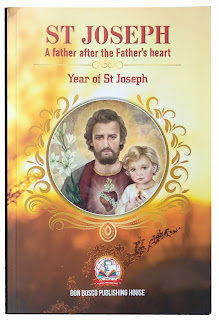ON MARIAN DEVOTION
Marian devotion is veneration and
honour rendered to Mary, the Mother of God, celebrating her unique place in the
redemption of mankind and beseeching her for favours. The famous Dominican theologian,
Edward Schillebeeckx wrote, “Veneration of Mary is firmly embedded in the
Christian religion, and its neglect inevitably leads to a disfigurement of
Christian life.” Words like ‘adoration’, ‘worship’, ‘veneration’ and ‘devotion’
are often confused and used interchangeably. They do however differ, albeit in
subtle ways. ‘Adoration’ and ‘worship’ are always and only directed to the
triune God. ‘Veneration’ and ‘devotion’ are afforded to Mary and the saints. It
is important to note that we do not pray to Mary in the same way we do to God.
We ask her to pray ‘to God’ for us - we invoke her intercession on our behalf,
whereas when we pray to God we ask directly for gifts and favours.
Schillebeeckx points out that our life of prayer will gain intensity and
effectiveness so long as it is united to the life-long prayer of Mary’s ‘fiat’, and thus ascends to the Father
through the Son -in other words, so long as we explicitly and consciously unite
our prayers to the prayer of Mary.
For Marian devotion to be fruitful
it must commemorate whatever Scripture teaches about Mary and must not fall
into superstition nor encourage fabrications of popular fantasy. Making dozens
of novenas or reciting myriad prayers, in the hope of attaining the sure path
to salvation - are distorted, falsified ideas held by people. These practices are
not wrong in-themselves, but excessive devotion to the point of obsession needs
to be guarded against and corrected. At times, the fine edge between
superstitious practices and expression of genuine confidence in Mary’s intercession
is difficult to trace. Greater emphasis is placed on the exact sequence of
prayers and the uninterrupted regularity in the devotion than on personal faith
and sincerity. Uneducated people are in danger of mixing ancient superstitions,
even magical practices, with devotion to Mary. Marian devotion must engender an
imitation of her virtues and not simply encourage the seeking of material
favours. “True devotion proceeds from true faith by which we are moved to a
filial love toward our Mother and to the imitation of her virtues.” (LG 67)
It is interesting to know that
Martin Luther and Huldrych Zwingli had respect for and devotion to Our Lady.
Zwingli wrote, “The more honour and love for Christ, the more also the esteem
and honour for Mary since she has borne for us such a great and merciful Lord
and redeemer.” Luther wrote about 60 sermons in praise of Our Lady. The ignorant
and often obsessive devotion of some of his contemporaries led him to go
against the Marian cult. Devotion to Mary has been alive in the Church from the
earliest times. What caused the reformers to rebel against the Marian cult, was
the excessive and almost god-like status accorded to the Virgin Mary. Such
devotion can be compared to a side chapel, attached to the main building of the
Church; however, it has slowly outgrown the principle nave. This exaggeration
is seen in the sheer volume of popular devotions that surround pictures,
statues and especially pilgrim centers of Mary. Far more people participate in
Marian devotions and especially in novenas than in the Eucharist. Apparitions,
true or alleged, draw millions to the spot where she was seen or gave her
messages. Thousands of candles are burnt before her shrines, flowers weigh down
her altars, whereas liturgical services often lack colour and inspiration.
Mary is truly ‘proclaimed blessed
by all generations’ by the Gospel (Lk 1:48), in the liturgy, preaching and
piety of the Church. Because she is present in the Church, as the first
Christian, she has her place in the proclamation of the Word of God by the
Church and in the spiritual life of the faithful. Pope Paul VI upholding Marian
devotion said, “She holds the loftiest position in the Church after Christ, and
the nearest to us.” The qualities of authentic Marian devotion are veneration,
love, invocation, praise, wonder, imitation and loving service. They provide
criteria for judging the quality of devotions. Devotion to Mary leads us to
contemplate and enter deeper into the mysteries of Christ.
Someone may ask, “Why Marian
Devotion?” “From this day forward all generations shall call me blessed.” (Lk.
1:48) “You do not praise and honour Mary without she joining you in praising
and honouring God. She is entirely relative to God” says St Louis de Montfort.
Devotion to Mary is essentially
devotion to God. Mary does not keep what is offered to her to herself rather
she humbly offers it to God. “While the mother is honoured, the Son is known,
loved and glorified.” (LG 66)
Pius IX calls Mary ‘the neck
joining the head (Christ) to the body (Church)’. Pope Benedict XVI said “Mary
is so interwoven in the mystery of the church, that she and the church are
inseparable.. She mirrors the church, she is the essence of the church without
distortion.” “Her sinless soul was filled with the divine Spirit of Jesus
Christ, more than all other created souls.” (Pius XII, Encyclical Mystici Corporis,
127)
Some question the need for Marian
Devotion. “Can we not ask God directly”, they say? Does scripture tell us that Christ
is the sole mediator? (1 Tim 2:5-6) Mary’s maternal duty does not obscure nor
diminish Christ’s unique mediation. Her Salvific influence originates not from
some inner necessity but from divine pleasure. It flows from the superabundance
of the merits of Christ, rests on his mediation, depends entirely on it and
draws all its power from it. Hence, it does not impede but fosters immediate
union with Christ.
Marian devotion is prayer with and to Mary. It is ‘to’- because we honour her while recognizing that
honouring her is praising Christ. Our prayers are joined to hers and her
prayers are joined to ours. We pray ‘with’ her, making her attitude our own. There
is an expression in Latin, ‘Lex orandi, lex credendi’ (the content of
prayer is the content of belief). Marian devotions have often emerged from the
springs of local devotion and culture. This idea is well represented by
Cardinal Newman, who said, “Belief is separate from devotion: belief is one and
the same everywhere, whereas expressions of devotion differ from place to
place.”
Before Vatican II, Marian
devotion seemed to be in competition with the liturgy. We may recall to mind,
incidents of people praying the rosary during the Holy Eucharist. But now, it
(marian devotion) is subsumed under the umbrella of liturgy. Liturgy sets the
standard for Marian devotion. Devotional practices need to be reformed and
harmonized with sacred liturgy, “since the liturgy by its very nature is far
superior to them.” (SC 13) Mary is often invoked in various liturgical prayers
like the “I believe”- born of the Virgin Mary; “I confess”-…I ask the Blessed
Mary, ever Virgin…; Prefaces of the Eucharist, Eucharistic prayers etc. This
only goes to show that devotion to Mary is an integral part of the church’s
belief and is not something alien to it.
Devotion to Mary is expressed
through prayers and practices of piety such as the rosary, angelus, wearing of
the scapular, processions, hymns, shrines etc. These have proven to be powerful
forms of prayer and have brought spiritual benefit to many. Mary is a point of
convergence for people of all faiths. Devotion to her could be used as a
starting point for evangelization. Vatican II encouraged the celebration of
Marian feasts to foster the deeper understanding of her place in the saving
mysteries of Christ.
There is a need for a
re-presentation of Marian devotion. A re-structuring- one that is suited to the
culture and mode of modern life. We cannot afford to hold on obstinately to
age-old tradition. Marian devotion calls us not to an imitation of the
lifestyle of Mary as much as it is calling us to imitate her spirit. Marian
devotion must communicate to people that Mary is not only our mother but also
our sister, the woman of deep faith, a mystic and prophet, the model disciple,
our co-pilgrim in life’s journey, the courageous woman who with prophetic
courage denounces all oppression and injustice, the woman who sides with all
the marginalized and the rejected in society and the woman who challenges as
well as assists in the unfolding of both women and men as authentic human
persons.
Karl Rahner was asked, “Why is it
in modern times that Marian devotion seems to be on the wane?” He wisely
replied, “Because it is children who need a mother and our modern generation
seems to have become too grown-up and sophisticated.” Pope Pius IX urges in his
bull, Ineffabilis Deus, “Cherish,
invoke, beseech the Virgin Mary with entire confidence have recourse to this
sweetest mother of grace and mercy in all dangers, difficulties, necessities,
doubts and fears. For nothing need be despaired or feared as long as she is our
guide and patroness.”



Comments
Post a Comment